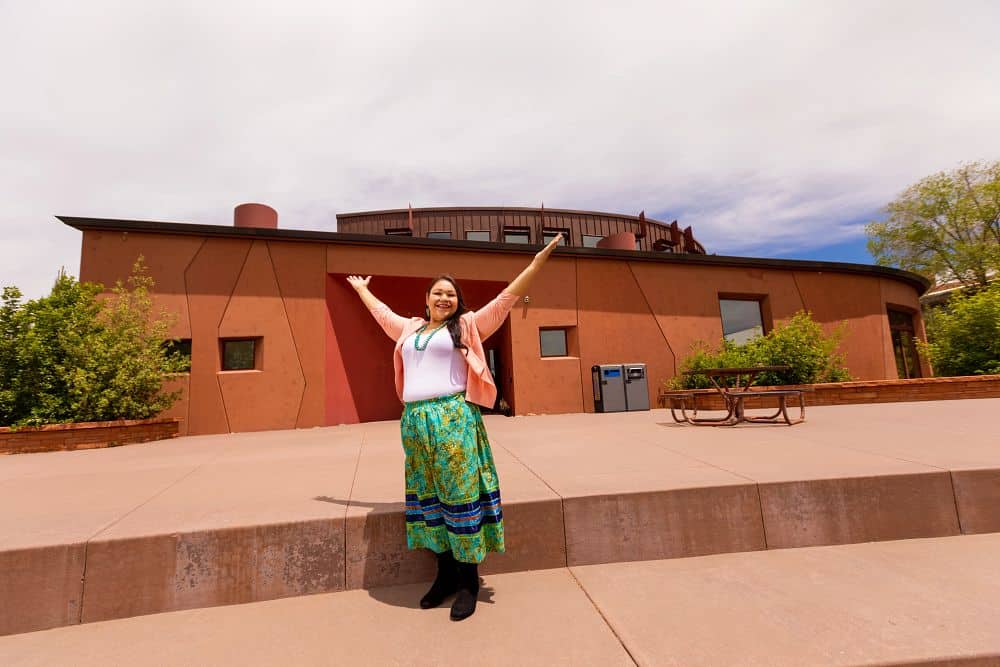NAU researchers will help lead the newly announced NSF Center for Braiding Indigenous Knowledges and Science (CBIKS)–a five-year, $30 million international NSF Science and Technology Center based at the University of Massachusetts Amherst. The center will focus on connecting Indigenous knowledges with “western” sciences to address some of the more pressing issues affecting people worldwide.
The center will work on complex, evolving challenges brought on by climate change, including dire impacts affecting land, water and plant and animal life; the danger posed to irreplaceable archaeological sites, sacred places and cultural heritage; and the challenges of changing food systems, all of which disproportionately affect Indigenous communities.
CBIKS will be led by a team that includes Sonya Atalay, provost professor of anthropology at UMass Amherst; Ora Marek-Martinez, associate vice president for Native American Initiatives and assistant professor of anthropology at NAU; Bonnie Newsom, associate professor of anthropology at the University of Maine; and Jon Woodruff, UMass Amherst professor of earth, geographic and climate sciences.
CBIKS will use community-based research to undertake place-based studies and projects in partnership with institutions and 57 Indigenous communities in eight international “hubs” in the U.S., Canada, Aotearoa New Zealand and Australia. The center’s team of more than 50 scientists—including more than 30 of the world’s leading Indigenous natural, environmental and social scientists, representing Native American, First Nations, Métis, Native Hawaiian, Alaska Native, Māori and Aboriginal Australian peoples—will work cross-culturally, involving Indigenous community members and scientific researchers. It has particular significance for NAU, which sits at the base of the San Francisco Peaks, which are held as one of the most sacred places for several Tribal Nations.
In addition to serving as co-principal investigator, Marek-Martinez also will take on the role of Southwest Hub co-lead for CBIKS alongside Ann Marie Chischilly, vice president of Native American Initiatives.
“CBIKS has transformative potential on both the local and international scale,” Marek-Martinez said. “It has been my experience that if we provide opportunities for Indigenous youth and students to engage, develop and learn that honors and includes the ways of living and being that are a part of their Indigeneity, while braiding western science in ways that are mindful of their homelands and communities needs and concerns, we can create educational pathways into STEM disciplines that support and prepare these Indigenous students in a relational way that models the familial support networks they have in their own communities.”
NAU will build on its longstanding commitment to Indigenous Peoples and robust resources in this area, including training pathways to STEM careers, Indigenous-based study abroad opportunities and funding opportunities for NAU and regional Indigenous communities in the areas of climate change, protection of heritage places and food sovereignty.
“When students, faculty and staff come to NAU, they bring their pedagogies and cultural knowledge with them, and this in turn guides and influences study and career paths, research projects and community service,” Chischilly said. “By braiding Indigenous knowledge, protocols and western research approaches we hope to create an Indigenous research paradigm that will guide partnerships with and by Indigenous Nations affiliated with the lands on which NAU sits.”
Through the CBIKS Southwest Hub at NAU, Marek-Martinez and Chischilly will be able to provide funding to sustain training and mentoring opportunities for graduate and undergraduate students, as well as provide support for NAU students to participate in Indigenous-based STEM study abroad opportunities in which students will work with other CBIKS hubs.
Upon the completion of the initial five-year award, the center will be eligible to receive further funding from the NSF to continue its mission.
More information about CBIKS, including lists of partner institutions, researchers and Indigenous communities, can be found at www.umass.edu/CBIKS.



